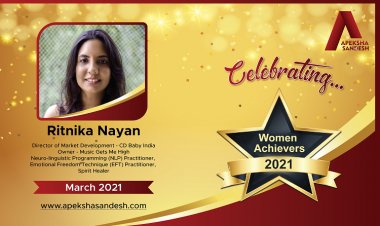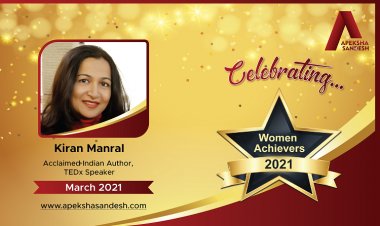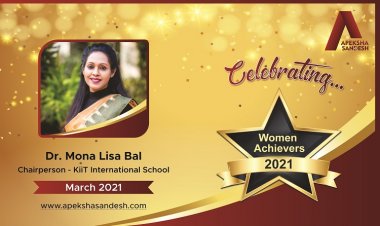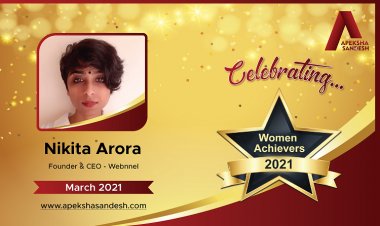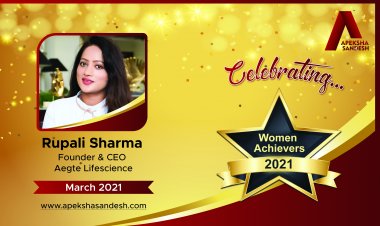We need the sort of writing that gives us a context, a purpose, a relation to the times that we are living in: Acclaimed Author Pratyaksha Sinha
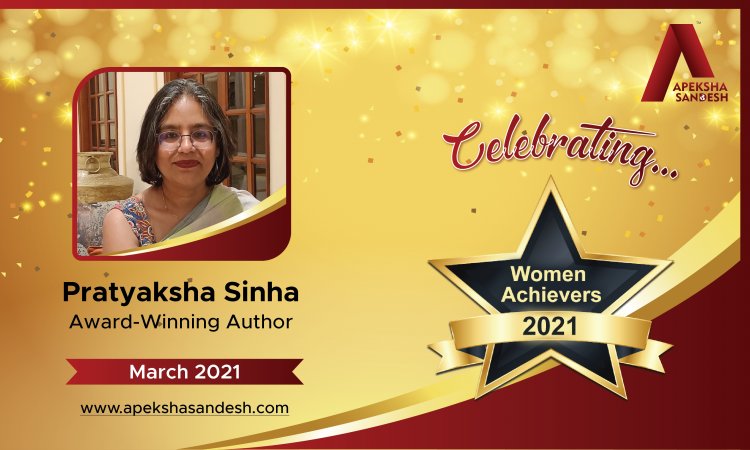
Acclaimed author Pratyaksha Sinha writes in English and Hindi languages. Her books have been published by some of the leading publishers in India and have won critical acclaim and admiration from readers as well as senior writers. Her stories have been translated into many Indian languages, as well as in English and Norwegian. While writing is her passion, she works full-time as Senior General Manager at Powergrid Corporation of India Limited.
Pratyaksha has won several awards, including the Indo Norwegian Award, Hans Katha Samman, and Krishna Baldev Vaid Fellowship. She has also been a resident of Sangam House. Pratyaksha Sinha received the Sonbhadra Katha Samman in 2011 for her short story collection in the Hindi language, ‘Jungle Ka Jadoo Til Til’.
Pratyaksha also paints and is passionately into music when time permits her after five days a week work schedule. She lives currently in Jammu where she is posted as Head of Finance.
In a candid conversation with Apeksha Sandesh, award-winning author Pratyaksha Sinha talks about her literary journey so far, literature that India needs, and even shares a few tips and tricks for aspiring authors. Check out the excerpts!
Tell us a bit about your journey of becoming a successful writer. How did it begin?
I started writing quite late, but the seeds of writing lay within me since my young age. Working full-time as a finance professional, managing a family, and indulging in my passion for music and painting gave me little time to begin writing. It was one thing that kept getting postponed till a time came when it became an insistent presence in my mind and heart. I started blogging and then moved on to poetry and fiction. My writings were published in all the leading literary magazines and then the books came. It has been a very creatively satisfying journey so far.
What is the biggest struggle of an author/writer/novelist today in India?
The biggest challenge is to get people to read. These are internet times. People are distracted by millions of things. The visual medium has flooded our intellectual environment. Everything is an instant two-minute experience. In such a time, getting people to sit back reading a book with a sense of infinite time is becoming more and more difficult. But paradoxically, you find more people writing. So now, we have a situation of everyone writing and no one reading.
Another thing is that you cannot make any money while writing. At least in Hindi. This means that you work for a living and that leaves you with too little time for literary pursuits.
What is the most important element for an author to focus on while working on writing fiction?
Fiction lets me be what I am not, but more importantly, it makes me what I would most be in my innermost core. Writing then is returning to that space, again and again, to reinvent my perceptions, to scratch the surface. It is like going on in an archeological expedition where each layer exposes a new memory. Writing for me is like drawing sweet water from the well, to drench my body and soul.
There should also be a sense of taking the reader by their hands and embarking on a journey together, whether an internal or an external one. There must be something that touches a chord so that you become one with the reader.
Literature plays a huge role in the growth of the country, considering culture, youth, etc. What do you feel that what kind of literature India needs currently?
We need the sort of writing that gives us a context, a purpose, a relation to the times that we are living in. We need hope. We need inspiration. We need dreams. Our country needs that. Our times need that.
eBooks have been in trend. Is it a pro or a con for the literature industry?
eBooks are becoming the new normal. It is easy to access, easy to keep as it takes less space. This is the future. But there is something very romantic and emotional to hold a physical book, to smell the pages, to feel the words – altogether a sense of connection!
List down your favorite 5 must-read books for literature lovers.
I am listing only Hindi books here. It is difficult to pick only five though.
- Aag Ka Dariya by Qurrutul Ain Haider’s
- Aadha Gaanv by Rahi Masoom Raza
- Parti Parikatha by Phanishwar Nath Renu
- Raag Darbari by Srilal shukl
- Naukar Ki Kameez by Vinod kumar Shukl
Please share a few tips and tricks for aspiring authors?
Well, I would suggest them to,
- Live with the story and the characters
- Be honest when writing
- Never be pretentious or sanctimonious
- Try to engage in an intimate dialogue with self
- Introspect, dream and take creative flight always
- Writing is a serious passion. Do not be frivolous with it
From where do you derive inspiration for your writings?
The world around me, and my memories. I recall Sherwood Anderson who had advised Faulkner to go back to Mississippi and write about things that he knew best. And then, he didn’t have to make the characters up. He just wrote them down. So that is how I feel one should write. Like Antonia Byatt said, “I think of writing simply in terms of pleasure.”
What is the biggest challenge you have faced in your career so far, due to being a woman?
I don’t let people judge me by my gender. It was not easy earlier, but now I have gradually become extremely comfortable in my skin and that helps. Also, I don’t give myself any excuses because I am a woman. I feel, I am equal to any man and that is how I behave.
Please share some details about your upcoming book, and when will it hit the stands?
My new book is a prose poetry book, Naino Beech Nabi (नैनों बीच नबी). It has been written in two languages, by two people straddling different geographical and time-space. It is being published by Raza Pustak Mala and is likely to be out by this month.
How do you feel about how women are represented in the media, television, web series, literature, films, etc.?
It is still a very stereotypical cliched representation. Women are either the sati savitri archetype or badass feminists. These are not ‘real women’.
In your opinion, what is the significance of International Women’s Day?
It gives us a day to sit back and introspect and to see where we have come and yet how far we still have to go. To quote Frost; miles to go before I sleep!
Apeksha Sandesh congratulates author Pratyaksha Sinha for her contribution and commitment towards Indian literature with her works as well as words and wishes her all the best for her future endeavours!



